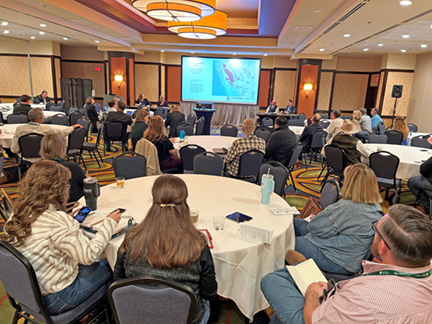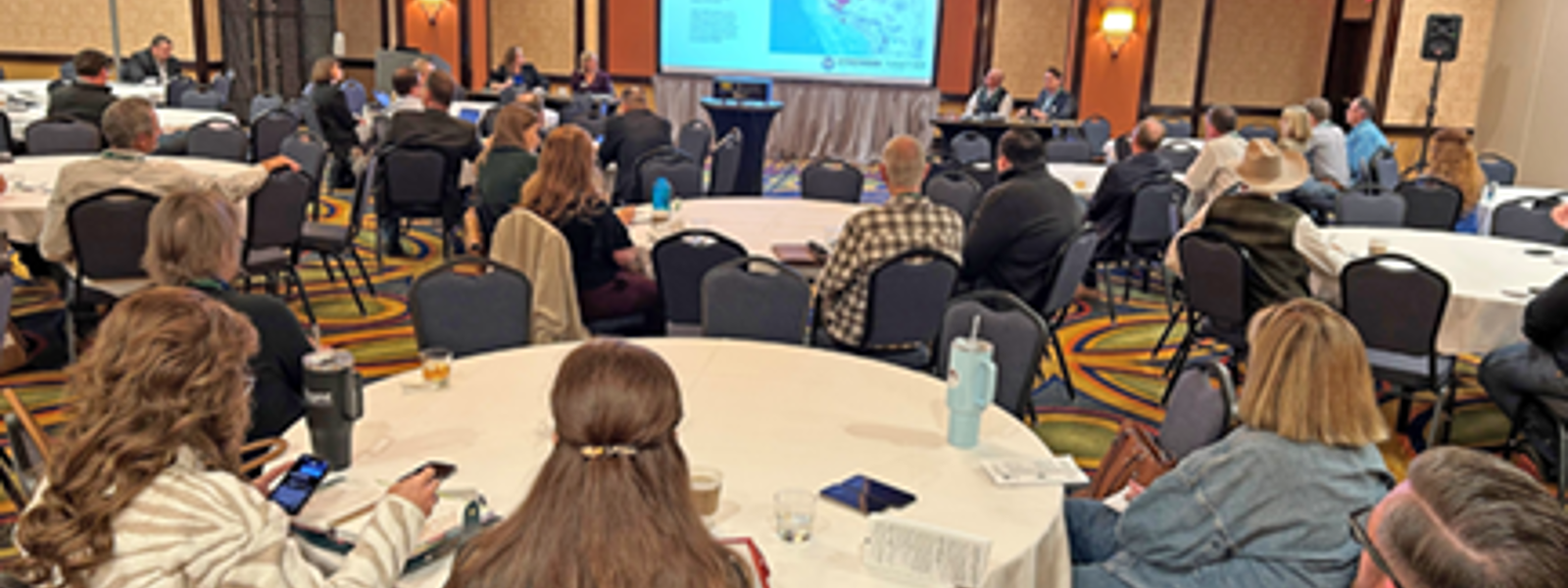Annual Meeting workshop takes on navigating SGMA

Navigating the challenges of SGMA, including the state probation process and how to fund and implement groundwater sustainability plans, was discussed as part of an educational workshop for members at the California Farm Bureau’s 106th annual meeting, held Dec. 9-10 in Monterey. Panel left to right: Kari Fisher, California Farm Bureau senior director and counsel of legal advocacy; Alexandra Biering, California Farm Bureau director of policy advocacy; Norm Groot, Monterey County Farm Bureau executive director and Justin Fredrikson, California Farm Bureau senior policy analyst.”
Photo/Christine Souza

By Christine Souza
Ten years into the state’s Sustainable Groundwater Management Act, or SGMA, local agencies are implementing plans and projects to achieve long-term sustainability in aquifers by limiting overdraft, land subsidence and impacts to drinking water.
Navigating SGMA challenges, including the probation process under the California State Water Resources Control Board and how to fund and implement groundwater sustainability plans, was discussed as part of an educational workshop for members at the California Farm Bureau’s 106th Annual Meeting in Monterey last week.
“Where we are in the state is trying to get all our basins balanced,” said Justin Fredrickson, California Farm Bureau senior policy analyst who provided an overview of the state’s landmark groundwater regulation.
“The state water board, frankly, does not have capacity to run these basins,” he added, “so if the basins do their homework and continue to chip away at this, I think that most, if not all of them, can avoid a (state-managed) interim plan.”
Local agencies that submitted groundwater sustainability plans in 2020, Fredrickson said, are now required to submit to the state a revised plan as part of a five-year review process.
“Some basins are already having their five-year reviews, and this is a revised plan submission where the state takes a whole new, fresh look at your plan,” he said. “With SGMA, you never really get out of having to develop these plans and must continue to implement them.”
For the five-year review, agencies must summarize basin conditions and describe implementation of projects and management actions and other information describing whether plan implementation is on track to meet measurable objectives and the sustainability goal for the basin.
Alexandra Biering, a California Farm Bureau policy advocacy director, told the group that the California Department of Water Resources is set to release draft best management practices that guide agencies to minimize or avoid subsidence in their basins.
“The document will be looking at how much subsidence have you experienced in your basin over the past 10 years and how much are you projecting for the future,” she said. “That will be tied to plan approval, so I want people to be prepared.”
Farm Bureau leaders also heard from Norm Groot, Monterey County Farm Bureau executive director, who said in his basin one agency oversees six subbasins. DWR rated some of the subbasins as critical or in overdraft and found two others to be sustainable, he said.
“We are dealing with a wide variety of different aspects of those subbasins within the one giant groundwater basin that we have,” he said. “The plans include the usual management practices and major projects, all with sustainable yields that the community made decisions on when we were formulating our plan.”
Funding projects in the basin to comply with SGMA, Groot said, is a concern.
“The projects are estimated to be about $600 million,” he said. “We’re doing feasibility studies to understand where the best bang for the buck is going to be, and yet we don’t have any water extraction fees.
“There’s a lot of decisions that the community is going to have to make,” Groot added, noting that demand management is a discussion dividing the community.
Related to assessing property-related fees to fund a groundwater sustainability agency, or GSA, Kari Fisher, California Farm Bureau senior director and counsel of legal advocacy, discussed the rate-setting process set forth in Proposition 218. Known as the Right to Vote on Taxes Act, the constitutional initiative adopted in 1996 requires voter approval and limits the methods by which local governments can create or increase taxes or fees.
“For a special tax, such as a fee increase for a GSA, you have to have two-thirds approval,” Fisher said. “Landowners also have the ability to do a written protest in opposition to this increase, which requires 50%, plus one vote to block the proposed charge, so these are some interesting things that are now in your hands.”
Related to Proposition 218 elections, Biering said Gov. Gavin Newsom signed new bills into law—Assembly Bill 2257 and AB 1827. AB 2257, she said, changes the Proposition 218 process by establishing more steps to disclose information sent to landowners. Information sent to landowners must also include instructions on how to submit objections to the assessment.
“A person or entity has 45 days to file that they intend to challenge the Proposition 218 rate increase,” Biering said. “You have to submit written comments in order to preserve your ability to sue later.”
AB 1827 allows water utilities to proportionately charge higher use-parcels for increased costs of facilities to accommodate the water usage.
Tulare County farmer Zack Stuller, who farms in the Kaweah, Kings and Tule subbasins, called the workshop “a very good refresher” and said he appreciated hearing more about Proposition 218. Most farmers in affected subbasins are informed about SGMA, Stuller said, adding that as president of the Tulare County Farm Bureau, he fields many calls about the groundwater regulation.
In the case of the Tulare Lake subbasin, local voters rejected fees as part of a Proposition 218 election. Kings County Farm Bureau Executive Director Dusty Ference said at the time that members were relieved the local fees were defeated and called the $11.5 million annual budget identified in the Mid-Kings River GSA’s fee study “excessively high.”
The Tulare Lake subbasin was placed under probation in April after the state said the subbasin’s plan failed to show how actions would address problems such as subsidence and impacts to drinking water. Fredrickson said probationary status and fees are on hold pending litigation by the Kings County Farm Bureau.
In addition to the Tulare Lake subbasin, DWR last March rejected groundwater sustainability plans for the following subbasins: Chowchilla, Delta-Mendota, Kaweah, Kern County and Tule. The action triggered the state intervention process, allowing the state water board to step in to manage the basin if necessary.
Basins are in different stages of the process, but in recent weeks, a meeting to consider whether to place the Kaweah subbasin under probation was canceled, while the Kern subbasin is set to appear before the board Feb. 20.
(Christine Souza is an assistant editor of Ag Alert. She may be contacted at csouza@cfbf.com.)




